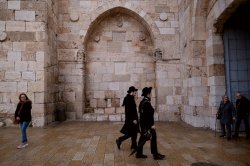Feb 17, 2021 @1:30pm | The Hindrances of Holographic Holocaust History?
Posted in: Work in Progress

This workshop features an International Network for the Theory of History conference paper (“The Hindrances of Holographic Holocaust History?”), which will be the basis for a journal article. The Illinois Holocaust Museum & Education Center, in association with the University of Southern California Shoah Foundation, is one of several homes to an exhibition of holographic Holocaust survivors. In anticipation of a future that has no living survivors, this interactive experience is designed to preserve and impart history, engender empathy, and connect the past to the present by simulating the immediacy of a real-time conversation. However, the mediated and spectral platform seems to fall short (if not undermine) the exhibition’s goals in three, interrelated ways. First, Americans lack basic knowledge of the Holocaust—a problem that virtual testimonies minimally redress. Akin to a sophisticated Google search, a key-word-activated algorithm plucks a response to voiced queries from hours of testimony, which provides no sense of chronology or “history” in the strictest sense. Second, holograms do not combat Holocaust denial or serve as more credible evidence than previous historical artifacts. Last, the empathy and intimacy that the holograms are meant to foster is limited. Compounding the distracting technical glitches, preliminary research indicates that the conspicuous artificiality of the holograms compromises this intimacy and may even encourage irreverence. In short, do these holographic testimonies largely bring history to life in ways that are meaningful for the present, or does this enlivened approach obscure the very history it seeks to enshrine?
Please contact Arnaud Kurze or Kate Temoney if you would like to join the workshop session.
Wednesday, February 17,2021 1:30-2:15 pm. Session held via zoom.
